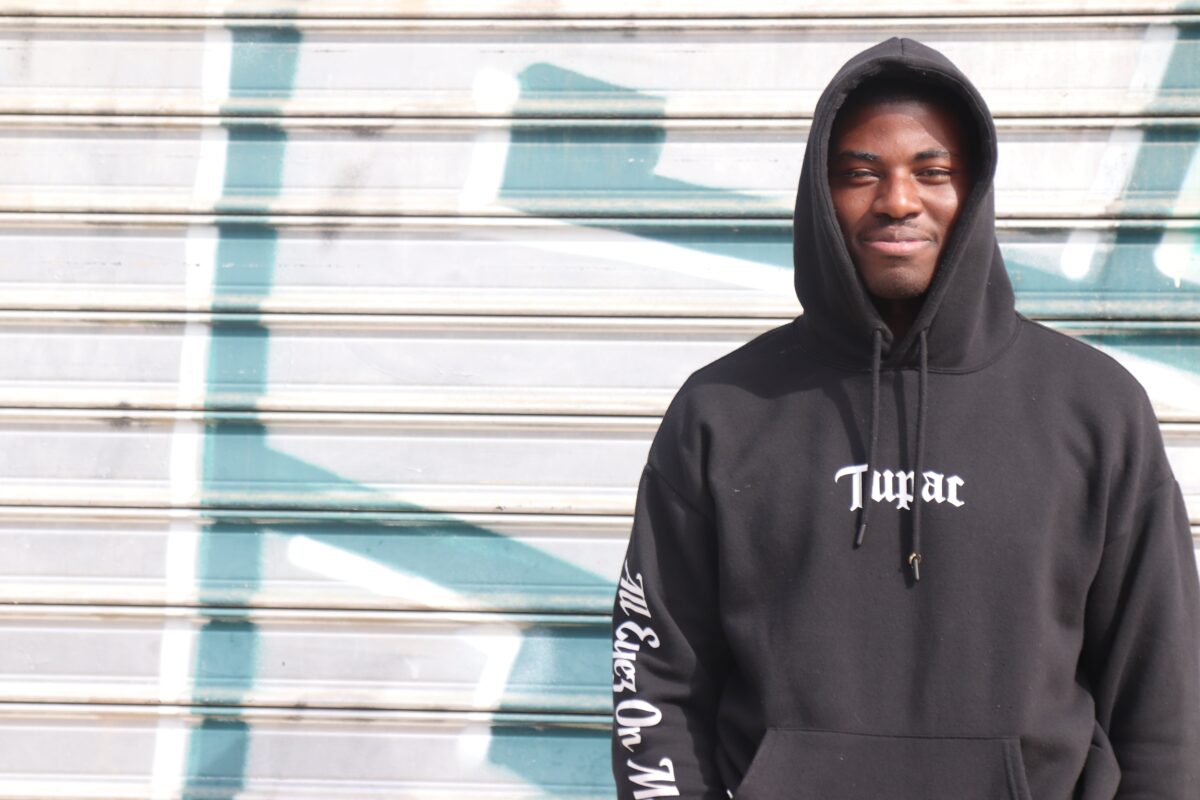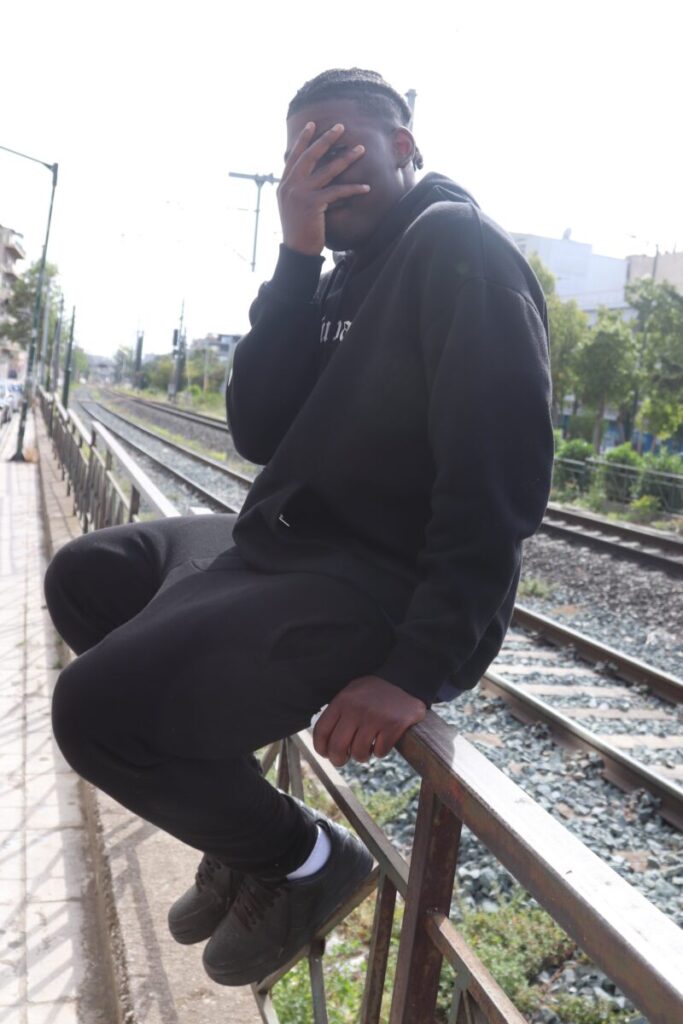Now I see you. Now I don’t. Daniel’s story facing the institutional racism

Now I see you. Now I don’t. This is how Daniel describes the system of the country that welcomed him. One day he is visible, the next day, invisible. But always powerless against it. A child of a single-parent family found in Greece, he was taken to an institution when his mother fell ill, and just before he came of age he was “thrown” into a world for which no one had prepared him.
Daniel came to Greece from Lebanon with his mother in 2009, when he was about 9 years old. They first settled in Thessaloniki and after a few months, they arrived in Athens. That’s when his experience with Greek bureaucracy began, as even his school registration was not simple. Daniel has never actually experienced parental custody. His father, presumably Ghanaian, was nowhere to be found, while his mother, of Nigerian descent, was diagnosed with a serious mental illness. In Greece, he ended up in an institution, with no papers, no passport, only a birth certificate from Lebanon, with his name misspelled…
Daniel had to change several schools. He was expelled several times. “I’m the kid who creates a fuss. Who always fights with other kids, who talks back”, he says. From Kypseli to Exarchia and from Exarchia to Vouliagmeni, Daphne, or Alimos, stability was not something he was familiar with. He could not easily adapt to new circumstances, as the environment was far from ideal; and with his mother in and out of health facilities, he was already at great disadvantage.
According to him, his years in the institution were fine. At least in the beginning. “I kind of felt like I was in a family. We ate together, they gave us shoes, took us for walks, even took us to camp in the summer.” He was visible, even a little bit. That was until the administration changed and a priest took over, “as if they wanted to erase that color and joy that existed, and from then on they started kicking kids like me out before we even finished school. Coming back to the institution one afternoon after school, a security guard was waiting for me, they handed me my things and told me to leave. Then they expelled almost half of the children from 15 to 17 years old, basically without any explanation and especially without any preparation for the outside world, for the day after.”
Not having finished school, with no guidance, and no supportive framework, Daniel found himself once again wandering as if he was invisible, searching for his place in the world. “When I left, I had no idea how I would be treated, what I would face. Then I said whatever will be, will be… All I could think about was being myself, but I didn’t even know me. While my mother was well she could work and support me. So, in the beginning, I didn’t have the stress of survival. Then my mother’s depression came, hospitalizations, relapses. She was trying to find a happy day. But that’s not possible.”
To the Greek state, Daniel was what is defined as “stateless”. And that means invisible for every state. He was not recognized by Lebanon, since the fact that he was born there, even with the wrong name on his birth certificate, did not give him any rights, nor by Nigeria, his mother’s country of origin, and, of course, nor by Ghana, where his absent father probably came from. By the time he reached 18, he could neither stay in the country nor be deported!
“The look on a policeman’s face is a terrible thing. It’s like he knows you don’t have papers and he’s singling you out, like he can see it in your eyes. During the lockdown, they kept stopping me, until Christmas 2020 when they caught me, handcuffed me, and took me to the lockup, where I stayed for a week. A difficult week among strange people, I didn’t know if I would come out the way I went in.” The police officers who caught him were boggled with the absurdity of the system, as if he had handcuffed them too and had their hands tied. Daniel did not have a residence permit, even though he was entitled to one after having attended school in Greece, as he had no other documents, such as a passport, to make the application. He had no papers as his mother, due to her illness, was unable to arrange for them to be collected while he was young. So, he had neither a residence permit to be released nor a passport to be expelled from the country… It is there where the system closes its eyes, pretends not to see, and keeps him in a state of insecurity and uncertainty.
“While I was growing up in years, even though I started to see a man in front of me in the mirror, I couldn’t take my life into my own hands. I had no papers for 4 years.” Daniel worked uninsured, was hiding, was subjected to daily extortion, and was for a long time in a state of slavery. No days off, no health care, no decent treatment, tied to the need of survival. His and his mother’s. It took the intervention of a humanitarian organisation to get him out of his deadlock and precariousness. A neighbor of his, Jessica, put him in touch with Generation 2.0 RED and the organization’s Legal Department took on the impossible: gathering all the paperwork they could, dealing with the administration’s stumbling blocks, circumventing the distortions of the system, and tackling head-on not only institutional racism but the racism of the legislation, which leaves no “window” for special cases such as Daniel’s.
“I felt like a mobile phone that you plug in, but the charger cable is broken, and it doesn’t connect properly. One moment it charges, the next it doesn’t. One moment I live like the others, the next I don’t. I had to keep fiddling with the cable to keep going.” This is how he describes his life after he left from the institution until his case could get on track.
It took more than three years of countless interventions, requests, and communications with stiff services in Greece, Lebanon, Nigeria, and Ghana, three years of pressure and legal documentation to bypass the numerous administrative obstacles that led time and again to a deadlock. At last, in February 2023, the Nigerian embassy issued Daniel a passport. This way he was able to apply for what he was entitled to for so many years: a “Second Generation” residence permit, which he got a few months later!
“One thing that changed in me when I got my second-generation permit was that I now look at police officers differently. At first, I thought that there were no longer as many uniformed people on the streets as there used to be. Then I realized that I was the one not seeing them anymore. And if I see them, I am not afraid that I will be arrested and find myself handcuffed in the lockup once again. I feel that for the state I am no longer “dangerous”. I am not invisible.”
Daniel may be visible for the state, but even now the residence permit regime denies him what he is entitled to. While he is diagnosed with a disability rating that entitles him to a benefit, he cannot apply for it unless he alters his permit from “Second Generation” to a “Humanitarian Reasons” residence permit. If he does so, he will lose his right to work and will be subjected to a process of constant permit renewal, since this permit is valid for one year. Although the Immigration Code regulates that equal access to social protection must be provided to every person entitled to it regardless of the type of residence permit, in practice this is not the case. Institutional racism is always present and is almost always the one obstacle that cannot be overcome.
In order for Daniel to have a residence permit today, to be able to work properly, to have all the necessary documentation, such as social security number, tax number, etc. it took a great struggle. His case is one of many others that Generation 2.0 RED has taken on over the years. His story clearly shows that when a child has no protection from their parents to help them balance on this “seesaw” system, they will end up on the “unseen” side. Daniel will never get Greek citizenship, of course, but this is something that does not concern him at the moment. At 23 now, he says “I’m still trying to figure out who I am on my own. Who I am in the society. And I try to keep the cable on charge.”


 Ελληνικά
Ελληνικά


